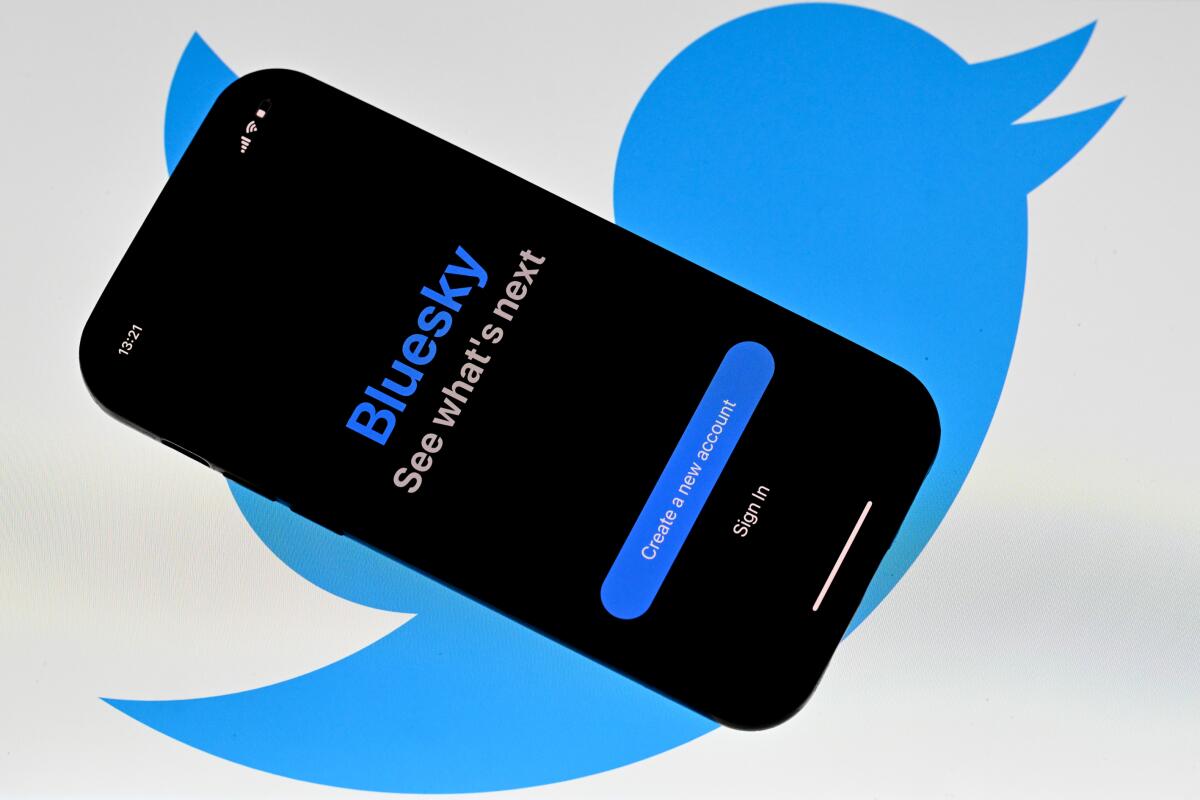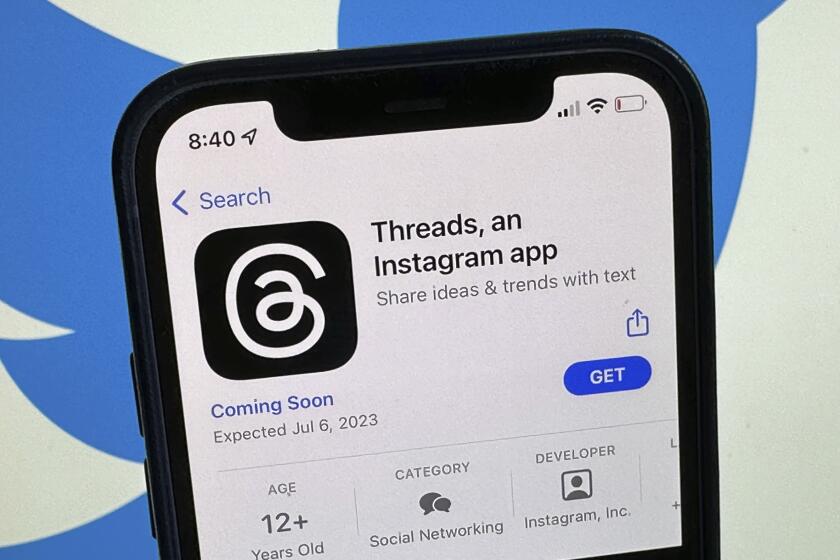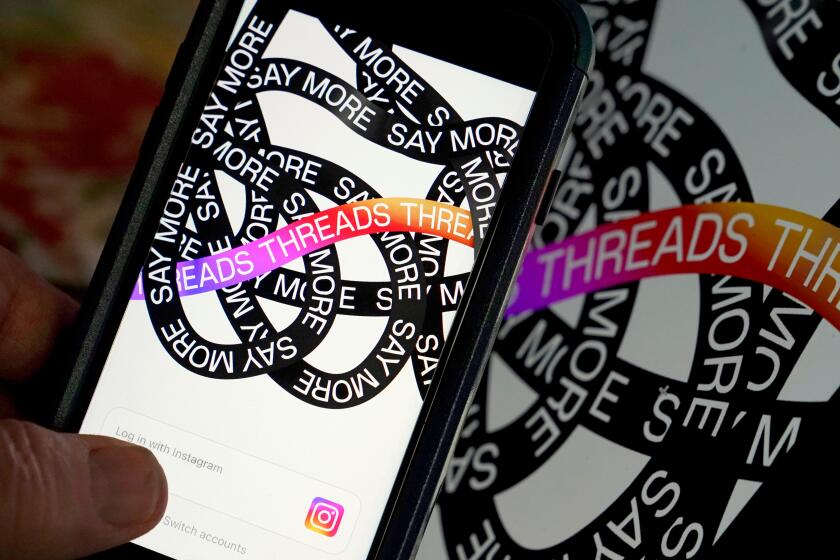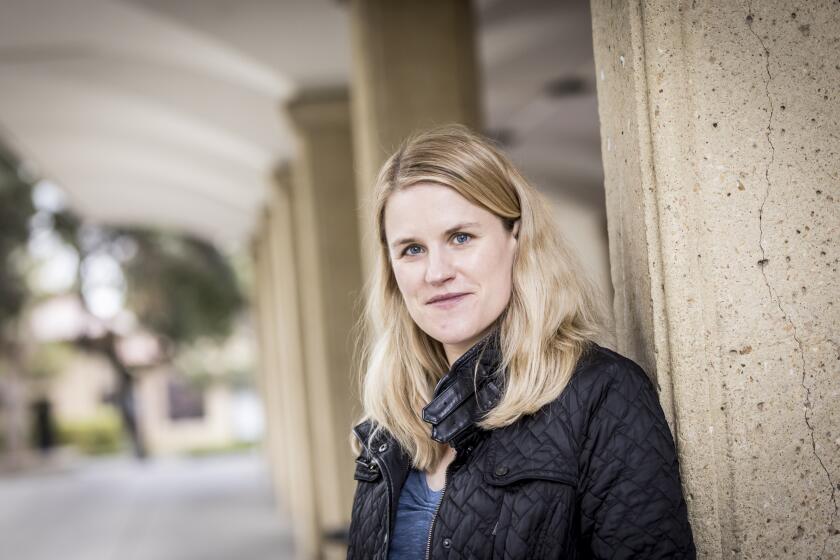Opinion: How I looked past Twitter and learned to like social media again

I had no plan to join Bluesky. Then a friend sent me an invite code, and I changed my mind. Bluesky is one of many social networks that have emerged to compete with Twitter, which, since Elon Musk gained control last October, has grown increasingly toxic. Alternatives have come fast and furious — Mastodon, with its multiple servers (too confusing); Post and Hive and Spill.
None have really stuck.
Then last Wednesday, Mark Zuckerberg’s Meta, which operates Instagram and Facebook, launched Threads, another Twitter-esque platform that within less than a week signed up more than 100 million users. “I’m not sure I can wrap my mind around that fact,” Threads’ boss Adam Mosseri posted.
All of this plays out against the accumulating chaos at Twitter. Over the Fourth of July holiday, the number of tweets users could see was suddenly limited. Musk bears much of the responsibility for the upheaval, with his penchant for conspiratorial tweeting, his broad-strokes notions of free speech and his general arrogance.
There’s no desktop version or chronological feed, but users fed up with Elon Musk’s Twitter are already flocking to Threads by the millions.
In some form or another, I’ve been on Twitter for nearly 15 years. I also have a Facebook account. I have resisted the urge to leave or join other networks for a variety of reasons, not least because it feels overwhelming. How many social media networks are too many? Besides, even now Twitter’s reach can keep me in touch professionally and personally with just about everyone I want to reach, and in something resembling real time. If there’s a lot on the site that repels me — the vax deniers, the white supremacists, the Christofascists — I also believe that we ignore the toxicity at our peril; it must be reckoned with.
So far, the opposite appears to be the case with Threads. According to Mosseri, the site de-emphasizes news and politics, no doubt as a way of avoiding the kind of digital gang-ups that have long been all too common on the bird app.
Many early reviews have not been kind, citing everything from the interface, which is mobile only, to the stultifying omnipresence of influencers and celebrities. The launch provoked a cease-and-desist letter from Twitter’s attorneys, claiming “systematic, willful and unlawful misappropriation” of its intellectual property, along with some NSFW attacks from Musk.
The Elon Musk versus Mark Zuckerberg cage match may actually take place in a courthouse after the Meta CEO launched his new app Threads on Wednesday.
For the time being at least, I’ll be watching the Threads-Twitter throwdown from the sidelines. I have yet to join Threads. In the proxy war between Musk and Zuckerberg — what, by the way, is the status of their cage match? — I’m a conscientious objector. Or maybe I just want them both to lose.
All of which brings me to Bluesky, which is not without issues of its own. One is the presence, on the board of directors, of Jack Dorsey, the former Twitter CEO whose tenure was only marginally less problematic than that of Musk.
The app can be glitchy, with updates that don’t load unless you refresh. Worse, there are those invite codes, which may be a necessary evil (Bluesky remains in beta testing) but nonetheless make for an uncomfortable exclusivity.
What social media promises, after all, is that you can talk to anyone. That this is illusory should go without saying; does Barack Obama really want to hear from me? The illusion, however, remains powerful because it feeds the idea that social networks represent a commons, a digital version of the public square.
This is an assertion I resist because it’s antithetical for the public square to be owned by a billionaire, or for the commons to come in competing multiples. And yet, I’d be lying if I didn’t admit that I also feel its pull.
There’s a paradox at the heart of Facebook, Twitter, Reddit and other companies that rely on user-generated content — and it’s leading to their downfall.
That’s part of what compels me about Bluesky. It’s sort of sleepy at the moment, like a city that has been platted but not fully built, with a lot of open space. Unlike Twitter, where my timeline refreshes dozens, even hundreds, of tweets at a time, Bluesky notifications inch up one by one.
In part, this has to do with my newcomer status; I’ve been on the site little more than a week. I’m still finding people to follow and having them find me. But it’s also due to the small number of users thus far. According to a representative of the network nearly 60,000 new accounts were created after Twitter announced it would be limiting posts, and there are reports of 1 million Bluesky downloads. Compare that to Threads’ 100 million sign-ups, or Twitter’s estimated 350 million users.
For a lot of people, volume is what’s exciting. But I prefer something a bit more manageable. I like not feeling compelled to keep the app open, not driven to check it constantly. In that, Bluesky reminds me of my earliest experiences on social media, when I had no preconceptions and had to learn it as I went along. The conversations then felt more intimate because they also seemed less public. Or maybe it’s that fewer users also means fewer trolls.
If Bluesky takes off, the few could multiply, and the intimacy could fade or just get tarnished, as it has on Twitter and Facebook. But for the moment, the slowness pleases me. Don’t get me wrong: I haven’t deleted my other accounts. But there’s something to be said for this quiet corner of the virtual commons, not least that it lets me stop to think.
David L. Ulin is a contributing writer to Opinion. His novel “Thirteen Question Method” will be published in October.
More to Read
A cure for the common opinion
Get thought-provoking perspectives with our weekly newsletter.
You may occasionally receive promotional content from the Los Angeles Times.













